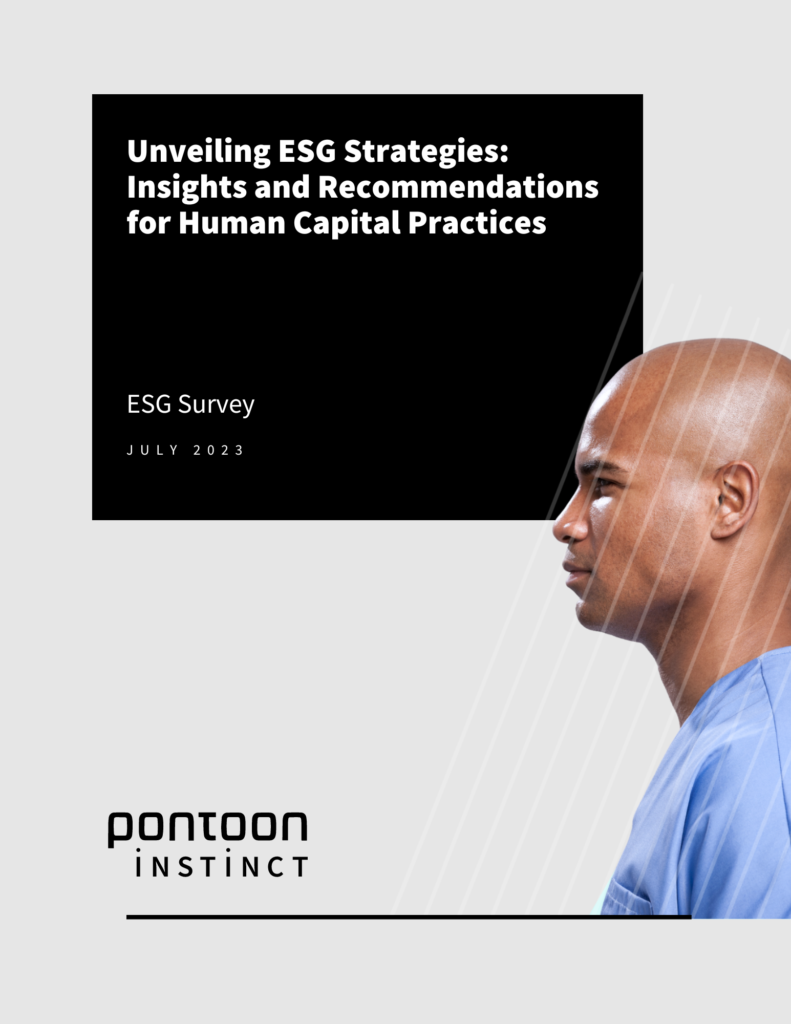Unveiling ESG Strategies: Insights and Recommendations for Human Capital Practices
Research
.
With growing scrutiny on businesses’ role in addressing environmental and social outcomes, many companies are embracing sustainable business practices as strategic imperatives while positioning themselves for the future. The environmental and social challenges the world faces today are complex and urgent, and the interdependency between people and the environment continues to be top of mind for employees and clients alike.
Against this backdrop, between January – March 2023, we fielded responses to inform the Pontoon Instinct and AXA Climate Snapshot Survey 2023. We received input from 60 ESG and HR industry peers across our combined networks, including public and private companies and prominent consulting firms.
The respondents comprise of 16% C-level executives and 84% leading ESG / HR practitioners.
Our central findings
Budget & investment
Only 21% of respondents are satisfied with their company’s investment in ESG to deliver on their organisation’s commitment, compared to 42% of respondents who would like to see additional budget allocated and increased executive buy-in. This is compared to 16% of total respondents who would like to engage additional support from external experts.
Strategic alignment
94% of respondents believe that ESG strategy is embedded as a core element of their company’s overall corporate strategy. Respondents are divided on whether ESG strategy incorporates a people component or if the ESG strategy is translated into HR strategy. Notably, many respondents believe ESG Strategy should sit as a standalone with a dedicated team and resources to drive the ESG mandate. From our experience, the human capital and ESG strategy is still mostly siloed or managed in different parts of the organisations.
New approaches to achieve DE&I goals
More than half of the respondents describe specific budgets available to foster an ESG-enabled people strategy, with 69% citing a focus on employee engagement compared to 54% describing the allocation used to support the leadership development of Diversity, Equity & Inclusion (DEI), employer value proposition (EVP). Finally, 46% of respondents want to see investment in net-zero/green transition skills gap, wellbeing & workplace architecture, and better workforce data.
When asked specifically how their company’s ESG strategy is shared when engaging with their people, 71% report internal communications, including townhalls and all colleague calls, as the main channel — underscoring the importance of leadership and executive buy-in.
When asked to identify barriers to accelerating the implementation of ESG strategies, 29% of respondents identified the need for insights and thought leadership (noting a current ineffective/ lack of shared outcomes & reporting accountability), 18% pointed to the suboptimal design of value-based tools & programs and 12% pointed to insufficient internal (executive) leadership/sponsorship.
In conclusion
The results of this survey further demonstrate the need for companies to set intentional and transparent ESG strategies in their short and long-term planning. In today’s global arena, pressures amplified from increasing energy costs, high inflation, rising interest rates, geo-political unrest, supply chain disruptions, a global pandemic and employees ranking ESG much higher up on their agendas mean that to attract and retain talent, investing in sustainable change on a behavioural, cultural, and organisational level is paramount.
At Pontoon Instinct, we work with organisations to develop and implement strategies that enhance the sustainability of human capital with a positive and measurable societal impact while contributing to core business strategy. We do this through:
- Providing solutions that promote inclusive hiring practices – eliminating harmful biases from the recruitment process through language that promotes equitable opportunities available to all populations, including under-represented communities and visible minorities. This includes pay gap analysis and external workforce alignment.
- Assessing and redesigning workforce strategy – building ESG into client business strategy so that it is part of everything they do as a company, enabling sustainability and delivering long-term value for their shareholders and wider stakeholders. This includes workforce analysis, market data and trend analysis, demographic analysis and location strategy.
- Providing solutions that re-engineer current business processes to enhance efficiency, optimise workflow, and minimise gaps in sustainability strategy and targets. This includes career mobility through redeployment, reskilling and upskilling as well as offboarding strategy.
Related Post
Discover our groundbreaking approach to diversity and inclusion in our latest whitepaper.
Recent research by Harvard Business Review has shown that unrepresented job candidates are less interested in working for companies ...





